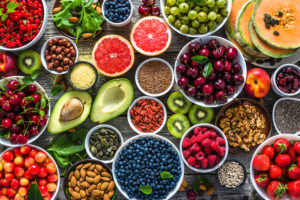Healthy Eating During Pregnancy
Pregnant women have unique health needs, as the foods they eat are the main source of nutrients for a growing baby. To cultivate healthy eating during pregnancy, it is important for pregnant women to plan in terms of vitamins and minerals and include foods that meet their unique nutritional needs, while limiting or avoiding certain processed foods, meats, and cheeses.
Foods to avoid:
For starters, pregnant women should avoid: refrigerated meat spreads; unpasteurized juices or milk; store-made salads (chicken, egg, tuna); unpasteurized soft cheeses (brie, feta, blue); raw sprouts; raw fish or refrigerated uncooked seafood (sushi, nova-style, lox, kippered, smoked, jerky); processed meats (hot dogs, deli meats); and certain cooked fish (shark, swordfish, king mackerel).
While fish and shellfish provide many important nutrients, such as iron and omega-3 fatty acids, pregnant women should be careful about both the type and frequency of seafood ingestion. The U.S. Department of Health and Human Services Office of Women’s Health recommends the following guidelines:
- Avoid fish high in mercury, such as swordfish, tilefish, king mackerel, and shark
- Eat up to six ounces per week of canned albacore or chunk white tuna
- Eat up to 12 ounces per week of cooked fish and shellfish including shrimp, crab, clams, oysters, scallops, canned light tuna, salmon, pollock, catfish, cod, and tilapia
Healthy foods to eat:
During pregnancy, women need increased levels of folic acid, iron, calcium, vitamin A, vitamin D, and vitamin B12. Specifically, pregnant women need 400 to 800 micrograms (mcg) of folic acid, 27 mg of iron, 1,000 mg of calcium, 770 mcg of vitamin A, 600 international unit (IU) and 2.6 mcg of vitamin B12. While taking supplements may help to reach these nutrient levels, it is preferable to consume vitamins and minerals through foods as certain supplements can contain higher than recommended levels of nutrients, which can be harmful to pregnant women.
To achieve healthy eating during pregnancy, see the list below of suggested foods per nutrient type especially important for pregnant women. This is not an exhaustive list but rather a starting point to help women plan a healthy diet for themselves and their babies.
Folic Acid/Folate
- Whole grains
- Avocados
- Eggs
- Beets
- Asparagus
- Leafy greens
- Legumes (lentils, peas, beans, chickpeas, soybeans, peanuts)
- Citrus fruits
- Brussels sprouts
- Broccoli
- Nuts and seeds
- Bananas
Iron
- Seafood (see specific seafood guidelines for pregnancy above)
- Legumes
- Broccoli
- Dark, leafy greens
- Lean meat
- Quinoa
- Nuts and seeds
- Tofu
- Dark chocolate
Calcium
- Dairy products
- Broccoli
- Dark, leafy greens
- Collard greens
- Soy beans
- Bok choy
- Oranges
- Seafood
- Legumes
Vitamin A
- Sweet potatoes
- Broccoli
- Dark, leafy greens
- Carrots
- Black-eyed peas
- Red bell pepper
- Mango
- Melon
- Apricots
- Tomatoes
- Pumpkin seeds
- Berries
Vitamin D
- Dairy products
- Fish liver oil
- Salmon
- Tuna
*Note: Vitamin D is the hardest nutrient to get solely from foods. A vitamin D supplement is recommended.
Vitamin B12
- Beef
- Chicken
- Seafood
- Dairy products
- Fortified breakfast cereal
- Eggs
More

